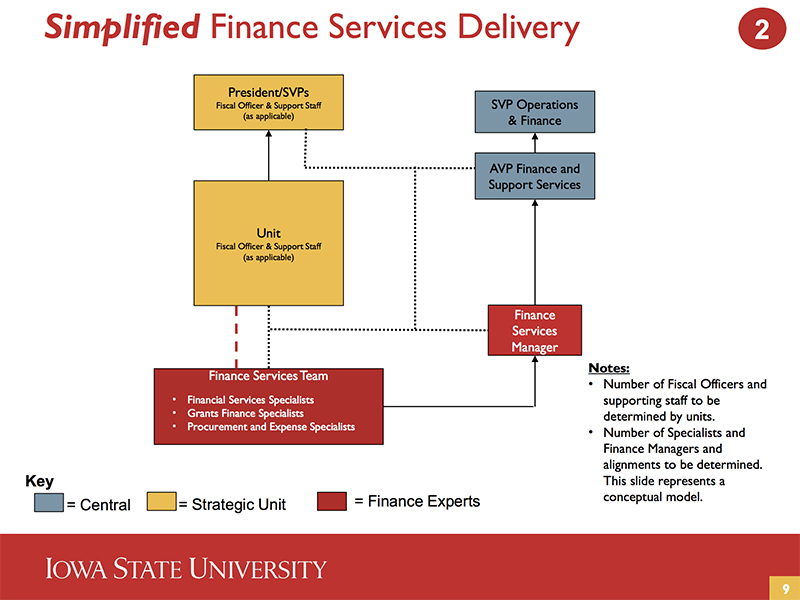
The refined proposed finance model for improved service delivery.
A Nov. 27 town hall presentation from the university's top financial officer gave a clearer picture of what tasks the specialists in new finance service teams will take on as part of the improved service delivery initiative.
For more information
The proposed reorganization would create teams of financial services, grants finance and procurement/expenses specialists who would be supervised by finance managers instead of leaders within their units -- the yet-to-be-defined groups of offices, centers, departments and colleges they will serve. Specialists would conduct financial transactions in Workday, a new platform for business processes set to go live July 1, 2019. Local departments would keep some finance staff to retain control over their own budget decisions and strategies.
The finance service teams incorporate the mission-specific customer focus of decentralized service and the economies of scale and consistency that centralization brings, said Pam Cain, interim senior vice president for finance and university services.
"We're trying to combine the best of both worlds," she said.
One way to think of how financial transactions would be divided between unit-level staff and the finance teams is to envision bookends, Cain said. Between local choices at the start and local approvals at the end is execution, which finance teams would handle.
"The units decide what they need to obtain, who needs to travel and what are appropriate activities for the grants. The finance specialists are in the middle, and they're trained to do the detail work and accomplish those required activities. Then the units give the final approval. The units would be the bookends. The finance teams are working their magic in the middle," she said.
Who does what
Resources available
Courses through Learn@ISU
- Rethinking Resilience: Coping in Our Every Day (Dec. 5, 9-11:30 a.m., MU Cardinal Room)
- Mindfulness Matters (Dec. 11, 1-2 p.m., MU Gold Room)
- Inspiring Your Day Through Purpose (Dec. 18, 1-2:30 p.m., MU Cardinal Room)
- Staying Charged through Change (available beginning in early December)
Courses through Lynda.com
- Coping with Change
- Why We Dislike Change
- The Change Curve
- Know Your Thought Processes
- How to Plan for Change
- How to Develop Mental Toughness
- Managing Organizational Change for Managers
Need someone to listen?
- Visit with UHR employee and labor relations staff, an HR liaison or the university ombuds.
Don't forget
- Employee Assistance Program is available 24/7 by calling 800-327-4692.
- ISU WellBeing website offers additional resources, including the employee well-being program Adventure2
Cain outlined how that would play out in more detail for each of the three specialist areas. Job descriptions for the roles released Nov. 26 remain drafts, as leaders continue to integrate feedback and additional complexities. The size and composition of the service teams would depend on the needs of their unit.
Financial decisions such as budget planning and analysis, including assessing financial health, will stay local. Finance service specialists will set up and modify payroll, monitor compliance with policies and procedures, and provide financial support not related to grants -- including entries and adjustments in the newly adopted accrual accounting system.
Procurement/expense specialists would support purchase cards, make travel arrangements, process expenses, and determine the best method for obtaining goods and services. Individuals could still book their own travel, and even file their own expenses, but specialists would be especially helpful with complicated travel, such as international trips, Cain said. For purchasing, employees who know what they need could use the CyBuy website. But specialists would have an in-depth grasp of the university's policies and its hundreds of vendor contracts. They could, for example, provide options for a table a department needs to buy, Cain said. But local staff would identify the table specifications needed and make the final selection, she said.
Existing staff would continue to handle grant applications and program activities, and the service delivery changes would not impact the office of sponsored programs administration. But grant finance specialists would process the fiscal aspects of grants, including accounting entries, procurement, travel, compliance and reporting. They would know the requirements for the major funding agencies in their unit, Cain said. Though the budget model funding mechanism for the service teams hasn't been finalized, it's important to continue allowing financial staff to count as matching funds for grants or to be paid from grants, she said.
"We've got to figure out a way to still do that," Cain said.
Because of its integration with student information -- which isn't part of the 2019 rollout of Workday, though it will be in coming years -- the accounts receivable office won't change due to improved service delivery, Cain said.
Valuing skills in hiring
The improved service delivery proposal -- prompted by the move to Workday and a need for uniform, efficient service with better supervision, training, workload balance and promotion prospects -- would restructure human resources work in a similar way as it would in finance, creating teams of HR specialists. Many staff with HR or finance duties currently do both or have other responsibilities. Cain's town hall followed a Nov. 13 forum where Kristi Darr, interim vice president for university human resources, detailed duties HR specialists would handle.
The shift from generalists to specialists is meant to be cost-neutral, with existing staff in as many of the new roles as possible. That will require a special hiring process, which was outlined in a plan released Nov. 19 by the equal opportunity office and UHR. Cain said job skills often will be more important than specific resume items. A survey is planned to determine which staff are interested in the new roles, and a job fair may give would-be applicants a chance to ask specific questions in one-on-one settings, she said.
"We're trying to be as flexible as possible," Cain said. "We're committed to internally filling these positions for all who want to go."
Advertisements for the finance managers who will oversee the finance service teams -- Cain anticipates hiring at least three -- are expected to be posted this week. The next major step is defining the units and the number of new specialist jobs to fill, which a tentative timeline calls for before the end of the year. Under the draft timeline, finance positions would be finalized in February.
"This is going to be a really unique experience," Cain said.
Related stories
- Improved service delivery moves forward with release of hiring plan, Nov. 29
- Staffing review is a first step toward aligning finance, HR positions with likely service delivery models, Nov. 15
- Phased approach proposed for service delivery changes, Nov. 15
- HR overhaul gets more detailed, with role added to help hire staff, Nov. 15
- Specialists improve service delivery in LAS, Nov. 8
- P&S Council asks for delay on improved service delivery plan, Nov. 1
- Town hall takes closer look at service delivery changes, Oct. 25
- Responsibilities, reporting lines could change for some staff, Oct. 4

